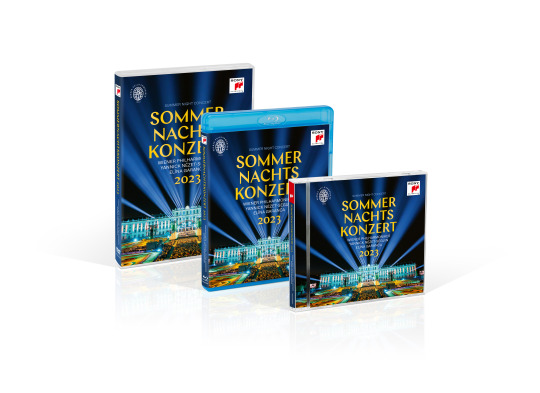#Rundfunk-Sinfonieorchester Berlin
Explore tagged Tumblr posts
Text

Currently Playing
Sergei Prokofiev IVAN THE TERRIBLE, Op. 116 Original Motion Picture Scores
Frank Strobel Marina Prudenskaya Alexander Vinogradov Rundfunk-Sinfonieorchester Berlin Rundfunkchor, Berlin
#film scores#Frank Strobel#Marina Prudenskaya Alexander Vinogradov#Rundfunk-Sinfonieorchester Berlin#Rundfunkchor Berlin#Sergei Eisenstein#Sergei Prokofiev#playing
0 notes
Text
youtube
Vincent d'Indy (1851–1931) - Choral varié (1903) ·
Johannes Ernst · saxophone
Performer: Rundfunk-Sinfonieorchester Berlin, Conductor: Vladimir Jurowski
7 notes
·
View notes
Text
19658863302/ William Youn:Boulanger, Fauré, Hahn (2CD)
巴黎的美好年代 2CD 布蘭潔、佛瑞、漢恩作品 尹威廉,鋼琴 ◎ 聆聽佛瑞、布蘭潔和漢恩的優美作品,開啟巴黎「美好年代」的音樂之旅 ◎ 2024年是佛瑞逝世100週年紀念,也是漢恩誕生150週年 ◎ 尹威廉的演奏充滿了微妙的情感深度和敏銳的分析 尹威廉是國際知名的優韓裔裔鋼琴演奏家之一,近年來名聲鵲起,西方媒體認為是「真正的詩人」,尤其是近期錄製的舒伯特專輯,更令他聲名大噪。在這張與瓦倫丁·烏留賓(Valentin Uryupin)指揮下的著名柏林廣播交響樂團(Rundfunk-Sinfonieorchester Berlin)合作錄製的第一張專輯中,他選擇了巴黎「美好時代」(Belle Epoque)中代表性的曲目,帶領樂迷聆賞佛瑞(Gabriel Fauré)、布蘭潔(Nadia Boulanger)和漢恩(Reynaldo…

View On WordPress
0 notes
Text
'VIEWS FROM THE EDGE' - w/c 8th January 2024
Jesse Rae ‘Jacob’s Pillow’
Lucy Spraggan ‘Run’
Steppenwolf ‘The Pusher’
Black Nazerene ‘Tsar Bomba’
Hijos De Muñoz ‘Rubicon’
Plainsong ‘True Story Of Amelia Earhart’
Violentine ‘Frozen Smile’
The Starlite Orchestra ‘Zorba’s Dance’
Rundfunk-Sinfonieorchester Berlin ‘Tosca, SC 69, Act I: Recondita armonia’
Elvis Presley ‘An American Trilogy (Live at The Honolulu International Center, Hawaii January 14th 1973’
Buzzkill Joy ‘Romance With My Bed’
Killdesco ‘Pompeii’
Mol Sullivan ‘Still Tryin’
Mango In Euphoria ‘Goddess’
Aziya ‘Atomic’
HotWax ‘High Tea’
Gia Ford ‘Sleeping In Your Garden’
Cardinals ‘Roseland’
Hannah Grae ‘Screw Loose’
Brazy ‘Attends’
Stooshe ‘Betty Woz Gone’
The Tibbs ‘Ain’t It Funny’
Frances Nero ‘Out On The Floor’
Nick Drake ‘Place To Be’
Little Feat ‘Fat Man In The Bathtub’
The Beat ‘Mirror In The Bathroom’
Amy Shark ‘Can I Shower At Yours?’
Clean Bandit ‘Rockabye (feat. Sean Paul & Anne-Marie)’
0 notes
Text
0 notes
Text
SUMMER NIGHT CONCERT 2023

SUMMER NIGHT CONCERT 2023 CON YANNICK NÉZET-SÉGUIN, LA MEZZOSOPRANO ELÏNA GARANČA Y LA FILARMÓNICA DE VIENA
Sony Classical se complace en anunciar el lanzamiento en DVD y Blue-Ray del Summer Night Concert 2023 con la Filarmónica de Viena junto al director Yannick Nézét-Séguin y la Mezzo-soprano Elīna Garanča como solista. Disponible el 14 de julio.
Consíguelo AQUÍ
El Summer Night Concert ya disponible también en CD y digital, tuvo lugar el día 8 de junio de, 2023. Se trata de un acontecimiento anual al aire libre, que se celebra desde 2008. El parque del Palacio de Schönbrunn, en Viena/Austria, se convierte en el mágico escenario del concierto. Han dirigido en años anteriores la orquesta grandes directores como Georges Prêtre, Daniel Barenboim, Franz Welser-Möst, Lorin Maazel, Christoph Eschenbach, Zubin Mehta, Semyon Bychkov, Gustavo Dudame, Daniel Harding y Andris Nelsons.
El evento fue presentado por primera vez por el maestro Yannick Nézet-Séguin y la mezzosoprano Elīna Garanča, que interpretaron tres arias de Carmen de Georges Bizet, Sapho de Charles Gounod y Samson et Dalila de Camille Saint-Saëns. También se estrenó una composición de Lili Boulanger, una conmovedora representación de la naturaleza realizada por la joven compositora que se convirtió en la primera mujer ganadora del prestigioso Premio de Roma en 1913.
El programa de este año contó con la presencia de la mezzo-soprano letona Elīna Garanča, que participó por primera vez en el Concierto Nocturno de Verano. Elīna Garanča se ha consolidado como una de las principales estrellas del mundo de la música gracias a sus actuaciones con las principales compañías de ópera y orquestas sinfónicas de todo el mundo. Ha sido aclamada por la crítica y el público por su hermosa voz, su talento musical inteligente y sus fascinantes interpretaciones escénicas. Entre otros papeles, es especialmente famosa por su interpretación de la Carmen de Bizet, que ha cantado en la mayoría de los principales teatros, como el Royal Opera House Covent Garden, la Bayerische Staatsoper, el Palau de les Arts Reina Sofía de Valencia o el Metropolitan Opera, con gran éxito de crítica; el NY Times la nombró "la mejor Carmen en 25 años". Para ver su biografía completa, haz clic aquí.
El director canadiense Yannick Nézet-Séguin ha trabajado con varias de las principales orquestas del mundo y mantiene una estrecha colaboración con la Wiener Philharmoniker, la Berliner Philharmoniker, la Bayerischer Rundfunk Sinfonieorchester y la Orquesta de Cámara de Europa. En septiembre de 2018, Yannick Nézet-Séguin se convirtió en el tercer director musical de la Ópera Metropolitana de Nueva York. Director musical de la Orquesta de Filadelfia desde 2012, se convirtió en director artístico y musical en febrero de 2023 y renovó su contrato hasta 2030. Como director musical y director principal de la Orchestre Métropolitain de Montreal desde 2000, firmó un contrato "vitalicio" en 2019. Es director honorario de la Rotterdams Philharmonisch Orkest tras haber sido su director musical de 2008 a 2018. También es Miembro Honorario de la Orquesta de Cámara de Europa. Para ver su biografía completa, haz clic aquí.
TRACKLIST:
1. Georges Bizet, Suite Nr. 1 aus der Oper Carmen (Arreglo de Ernest Guiraud 1885)
Nr. 5. Les Toréadors (Vorspiel zum 1. Akt)
Nr. 2. Intermezzo (Vorspiel zum 3. Akt)
Nr. 1a. Aragonaise (Vorspiel zum 4. Akt)
2. Georges Bizet, Habanera aus der Oper Carmen
3. Lili Boulanger, D‘un matin de printemps. Fassung für Orchester 1918
4. Hector Berlioz, Ouvertüre zur Oper Le Corsaire op. 21
5. Charles Gounod, „O ma lyre immortelle“ Arie aus der Oper Sapho
6. Maurice Ravel, Daphnis et Cloé. Suite Nr. 2
7. Camille Saint-Saëns, „Mon cœur s’ouvre à ta voix” Arie aus der Oper Samson et Dalila
8. Maurice Ravel, Bolero
0 notes
Video
youtube
Robert Schumann: 3 Romances, Op. 28: No. 2 in F-Sharp Major Arranged for piano and orchestra by Gerhard Ewald Rischka
Performed by the Berlin Radio Symphony Orchestra, with Rainer Carell on solo piano, conducted by Robert Hanell
#Robert Schumann#Schumann#Gerhard Ewald Rischka#Robert Hanell#Berlin Radio Symphony Orchestra#Rainer Carell#Rundfunk-Sinfonieorchester Berlin#classical music#romantic period#romantic era#music#3 Romances Op. 28: No. 2 in F-Sharp Major#3 Romances Op. 28#3 Romanzen Op.28#Romance No. 2 in F-Sharp Major
3 notes
·
View notes
Video
youtube
1 septembrie 2021, LES NOCES, Stravinsky
Regia multimedia, Carmen Lidia Vidu
În 14 februarie 1926, George Enescu a fost unul dintre cei 4 pianiști care au cântat în premieră americană lucrarea „Les Noces” de Igor Stravinski. Era cunoscută admirația lui Enescu pentru compozitorul rus pe care îl considera genial. „Les Noces / Nunta” s-a bucurat de un real succes și a fost interpretată de două ori în seara premierei americane. George Enescu Festival a marcat aniversarea a 140 de ani de la nașterea marelui compozitor român precum și 50 de ani de la moartea compozitorului Igor Stravinski printr-un „dialog” Stravinski-Enescu în care s-au auzit lucrări semnate de aceşti doi muzicieni. Pe 1 septembrie, la Sala Palatului, s-a auzi în premieră „Les Noces” de Stravinski. Concertul a fost susţinut de Orchestra Simfonică a Radiodifuziunii din Berlin condusă de Vladimir Jurowski. Cei patru pianiști au fost Alexandra Silocea - Pianist, Mihai Ritivoiu, Daniel Ciobanu, Andrei Licareț.
RUNDFUNK-SINFONIEORCHESTER BERLIN VLADIMIR JUROWSKI conductor RALF SOCHACZEWSKY assistent to the chief conductor CHOIR OF THE GEORGE ENESCU PHILHARMONIC IOSIF ION PRUNNER conductor of the choir CARMEN LIDIA VIDU multimedia director
Stravinsky Les Noces (Russian choreographic scenes with singing and music for voices, four pianos and percussion) SOFIA FOMINA soprano ELENA MANISTINA mezzo-soprano ALEXANDER FEDOROV tenor VLADIMIR OGNEV bass DANIEL CIOBANU piano (laureate of the Arthur Rubinstein International Competition) ANDREI LICAREȚ piano MIHAI RITIVOIU piano (laureate of the George Enescu International Competition) ALEXANDRA SILOCEA piano (Bösendorfer Artist)
#CARMEN LIDIA VIDU#les noces#igor stravinsky#Vladimir Jurowski#RUNDFUNK-SINFONIEORCHESTER BERLIN#RALF SOCHACZEWSKY#CHOIR OF THE GEORGE ENESCU PHILHARMONIC#IOSIF ION PRUNNER#SOFIA FOMINA#ELENA MANISTINA#ALEXANDER FEDOROV#VLADIMIR OGNEV#DANIEL CIOBANU#ANDREI LICAREȚ#MIHAI RITIVOIU#ALEXANDRA SILOCEA#george enescu festival#festivalul george enescu#Scurt Jurnal de Creație la Festivalul George Enescu
2 notes
·
View notes
Photo

Rundfunk-Sinfonieorchester Berlin - Zar Und Zimmermann / Halka
Eterna
1961
12 notes
·
View notes
Video
youtube
Dame Sarah Connolly sings Das Lied von der Erde part 4, “Von der Schönheit,” in a live recording recently released by Pentatone. The orchestra is the Rundfunk-Sinfonieorchester Berlin, conducted by Vladimir Jurowski.
4 notes
·
View notes
Audio
Symphony No.1 in E Minor, Op.1: III. Scherzo: Vivace (1884 Version)
By Composer Nikolai Rimsky-Korsakov
Performed By Conductor Gerard Schwarz And Rundfunk-Sinfonieorchester Berlin

#symphony no.1#symphonies#nikolai rimsky-korsakov#russian composers#late romantic period#the five#classical music#audio#audio post#il nero virtuoso
57 notes
·
View notes
Text
I la cita anual a Waldbühne no podia mancar a IFL, diguem que és com l’inici oficial de l’estiu més popular i festiu, al costat d’altres propostes més contundents, selectes i prestigioses, però el concert estiuenc en el parc berlinès suposa alhora que trobar-nos amb artistes de nivell, una festa popular, a la que no hi poden mancar les concessions a un públic televisiu, amb un disseny de llums multicolor, mappings a l’escenari i grans angulars per fer-ho ben digerible.
En qualsevol cas si en la majoria d’anys el programa acostuma a ser variat i amb obres gens complicades, aquesta any la tria no podia ser més assequible, amb una mica d’òpera amb el “Cielo e mar” per iniciar i el Nessum dorma per concloure i un monogràfic dedicat a Cavalleria rusticana, més la concessió verdiana amb l’obertura de I Vespri sicilani escapçada, al menys a la televisió, ja que la resta van ser cançons italianes de tots els temps, que quasi van fer que el concert semblés un recopilatori de San Remo.
La gran troballa, a banda d’un Kaufmann en plenitud vocal i afinació discutible, va ser la participació de l’ètnica mezzosoprano Anita Rachvelishvili que canta una mesurada Santuzza i interpreta un Caruso de Lucio Dalla ·di tutto rispetto que dirien els italians, cantant com a vocalista i amagant de manera molt intel·ligent la impostació lírica, alhora que cantant alla Mina, un Volare de Modugno amb Kaufmann de manera simpatiquíssima i distesa. A Rachvelishvili, vists els resultats del concerts la trobo a faltar més tot i que l’estel mediàtic de Kaufmann pot amb tot i nomé faltava el Nessum dorma, degudament abaixat de to, generós i rotund per intentar fer oblidar que per poc que s’ho proposi ella s’ho menja tot i a tots amb patatones.
Musicalment no hi ha cap repta. És un repertori agraït en el que a Kaufmann malgrat el bon estat vocal, li manca aquella claredat solar que la seva veu no posseeix i aquell fraseig fresc i sincer que fa que el “cielo e mar” a banda de lleugerament desafinat quedi distant i gèlid. La italianitat de Kaufmann brilla per la seva absència, el que no vol dir que amb el seu carisma no sigui capaç d’arreplegar al seu voltant no només als seus compatriotes, sinó al gran públic que estim ai valora les personalitats vocals i ell no hi ha dubte que ho és, com ho era Domingo quan era boníssim i tants que ara l’idolatren el criticaven sense pietat. No esperem a gaudir de Kaufmann quan estigui en el seu declivi, perquè ara malgrat no sé el tenor més idoni per fer el repertori d’aquest concert, no té rival.
Ella ja he dit que és la perla del concert, perquè sabent que la immensa majoria dels aplaudiments seran per a ell, canta de manera intensa i sincera, adequant estils i acabant sent més entranyable que l’amiga de l’emèrit, aquesta de veritat.
Una festa simpàtica com aperitiu als grans esdeveniments que ens esperen els propers dies.
Què vagi de gust
Giuseppe Verdi Obertura de I Vespri Siciliani
Amilcare Ponchielli Cielo e mar!” de La Gioconda
Pietro Mascagni Voi lo sapete, o mamma de Cavalleria Rusticana Tu qui Santuzza… No, no, Turiddu de Cavalleria Rusticana Intermezzo de Cavalleria Rusticana Mamma! Mamma, quel vino e generoso de Cavalleria Rusticana
Ernesto de Curtis Ti voglio tanto bene”
Ruggero Leoncavallo Mattinata
Lucio Dalla Caruso
Ernesto de Curtis Torna a Surriento
Romano Musumarra Il Canto
Ernesto de Curtis Non ti scordar di me
Propines Nino Rota Parla più piano Domenico Modugno Volare Giacomo Puccini Nessum dorma de Turandot
Anita Rachvelishvili (Mezzosoprano) Jonas Kaufmann (tenor)
Rundfunk-Sinfonieorchester Berlin Direcció musical: Jochen Rieder
Waldbühne, Berlín 13 de juliol de 2018
Waldbühne 2018: Jonas Kaufmann i Anita Rachvelishvili I la cita anual a Waldbühne no podia mancar a IFL, diguem que és com l'inici oficial de l'estiu més popular i festiu, al costat d'altres propostes més contundents, selectes i prestigioses, però el concert estiuenc en el parc berlinès suposa alhora que trobar-nos amb artistes de nivell, una festa popular, a la que no hi poden mancar les concessions a un públic televisiu, amb un disseny de llums multicolor, mappings a l'escenari i grans angulars per fer-ho ben digerible.
#Amilcare Ponchielli#Anita Rachvelishvili#Domenico Modugno#Ernesto De Curtis#GGiuseppe Verdi#Giacomo Puccini#Jochen Rieder#Jonas Kaufmann#Lucio Dalla#Nino Rota#Pietro Mascagni#Romano Musumarra#Rundfunk-Sinfonieorchester Berlin
0 notes
Text
youtube
Hans Sommer (1837-1922) - Erinnerung
Artist: Mojca Erdmann
Orchestra: Rundfunk-Sinfonieorchester Berlin, Conductor: Guillermo García Calvo
3 notes
·
View notes
Text
Rimsky-Koraskov: Suites (1997) - Rundfunk-Sinfonieorchester Berlin
2 notes
·
View notes
Text
Rundfunk-Sinfonieorchester Berlin, Vladimir Jurowski, Leonidas Kavakos in ADDA Alicante
There isn't anything standard about execution, nothing unsurprising about experience, except if, obviously, it is depleted of all correspondence by a basic to supply an item. Then, maybe really at that time, injuries of structure dominate and rule. What's more, a show program including Mozart's Wear Giovanni Suggestion, the Brahms Violin Concerto and afterward Schubert's 10th Ensemble may very well sound somewhat OK, exceptionally defenseless to the sort of conveyance that could pander first to crowd assumptions and really at that time to understanding. Assumptions were along these lines not high, however it was charming to be back in Alicante's ADDA theater without assigned empty seats to uphold social separating. Essentially we were a crowd of people once more.
Underlying feelings were that this visiting Symphony, the Rundfunk-Sinfonieorchester Berlin, would be minuscule, since the seats organized on the stage appeared to leave huge spaces. Yet, to some degree in the size of organization, none of these works approaches the self important, in spite of the way that Schubert obviously applied the term to his work's length.
Truth be told, how should any show be viewed as uninteresting when the guide is Vladimir Jurowski and the soloist Leonidas Kavakos?
Furthermore, what might be said about, from first note to endure, the brilliant splendid sound of this ensemble's strings? They have a surface that appears to be sharp, in its assault, not its resonance! There is by all accounts an edge, Timespure for need of a superior word, that shapes the expressions of the music into something substantially more than multiplication, considerably more than perusing off the page.
The splendor of the sound astonishments, delivering even the totally natural into new experience.
As Mozart's suggestion was reasonably emotional, yet in addition new and, surprisingly, amazing. Following a month without instrumental sound, the initial harmonies did something amazing.
Vladimir Jurowski is tall. Leonidas Kavakos is taller. During the long instrumental prologue to the Brahms concerto, he confronted the symphony. This, most likely, was something like a sign of how much this soloist viewed the symphony as his accomplice instead of as his vehicle. Furthermore, the Brahms concerto is an incorporated work, a genuine cooperation among symphony and soloist, never a contest. The nature of shared experience was conveyed impeccably by the entertainers thus, even in this work that the crowd had heard so often previously, they by and large inhaled outside air into the amphitheater. Also, the crowd inhaled uninhibitedly, in spite of the covers. The flawlessness accomplished in front of an audience converted into a forty-minute execution that was gotten by a stuffed crowd in complete quiet, with each note enlisted and each expression comprehended. This was correspondence, not simple fortitude. Leonidas Kavakos offered a reprise of solo JS Bach and, after the Brahms, the misleading statement was practically more extreme than what had gone before it.
In certain hands Schubert's 10th Ensemble, the supposed Extraordinary C Major, can continue a little. This exhibition was publicized as enduring fifty minutes, so obviously not every one of the rehashes were played. They seldom are.
Yet, it should be recorded that under Jurowski's twirly doo, this extensive work seemed to be new, unique and committed. There was not a solitary note in the hour when anybody in the crowd felt that this was standard collection being conveyed with standard understanding. This felt especially unique.
The subsequent development, close by the threesome segment from the scherzo, could be confused with Mahler, very nearly a century ahead of schedule. It merits recollecting, as the program notes brought up, that Schubert never heard the work, that it was not debuted until more than 10 years after its arranger's demise and that, at that point, performers who saw the work considered it is troublesome, unplayable and presumably numerous different things that they dare not say since it didn't adjust with their assumptions. Or on the other hand maybe, given a cutting edge relationship, they considered the work expected as being over their head. This presentation by the Rundfunk-Sinfonieorchester Berlin under Jurowski repeated a feeling of newness and innovation, maybe something like Schubert had imagined, the sound world that beguiled the writer's counterparts. This time the secret was illuminating.
0 notes
Text
1 note
·
View note